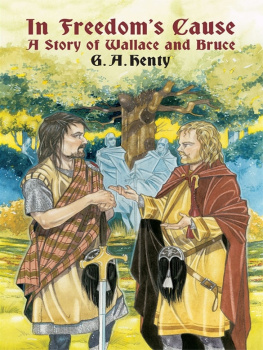A MARCH ON LONDON
BEING A STORY OF WAT TYLER'S INSURRECTION
BY G. A. HENTY
PREFACE
The events that took place during the latter half of the fourteenth century and the first half of the fifteenth are known to us far better than those preceding or following them, owing to the fact that three great chroniclers, Froissart, Monstrelet, and Holinshed, have recounted the events with a fulness of detail that leaves nothing to be desired. The uprising of the Commons, as they called themselvesthat is to say, chiefly the folk who were still kept in a state of serfdom in the reign of Richard II.was in itself justifiable. Although serfdom in England was never carried to the extent that prevailed on the Continent, the serfs suffered from grievous disabilities. A certain portion of their time had to be devoted to the work of their feudal lord. They themselves were forbidden to buy or sell at public markets or fairs. They were bound to the soil, and could not, except under special circumstances, leave it.
Above all, they felt that they were not free men, and were not even deemed worthy to fight in the wars of their country. Attempts have been made to represent the rising as the result of Wickliffe's attack upon the Church, but there seems to be very small foundation for the assertion. Undoubtedly many of the lower class of clergy, discontented with their position, did their best to inflame the minds of the peasants, but as the rising extended over a very large part of England, and the people were far too ignorant to understand, and far too much irritated by their own grievances to care for the condition of the Church, it may be taken that they murdered the Archbishop of Canterbury and many other priests simply because they regarded them as being wealthy, and so slew them as they slew other people of substance. Had it been otherwise, the Church would not have been wholly ignored in the demands that they set before the king, but some allusion would have been made for the need of reforms in that direction.
The troubles in Flanders are of interest to Englishmen, since there was for many years an alliance, more or less close, between our king and some of the great Flemish cities. Indeed, from the time when the first Von Artevelde was murdered because he proposed that the Black Prince should be accepted as ruler of Flanders, to the day upon which Napoleon's power was broken forever at Waterloo, Flanders has been the theatre of almost incessant turmoil and strife, in which Germans and Dutchmen, Spaniards, Englishmen, and Frenchmen have fought out their quarrels.
G. A. HENTY.
CHAPTER I.
TROUBLED TIMES
And what do you think of it all, good Father?
'Tis a difficult question, my son, and I am glad that it is one that wiser heads than mine will have to solve.
But they don't seem to try to solve it; things get worse and worse. The king is but a lad, no older than myself, and he is in the hands of others. It seems to me a sin and a shame that things should go on as they are at present. My father also thinks so.
The speaker was a boy of some sixteen years old. He was walking with the prior in the garden of the little convent of St. Alwyth, four miles from the town of Dartford. Edgar Ormskirk was the son of a scholar. The latter, a man of independent means, who had always had a preference for study and investigation rather than for taking part in active pursuits, had, since the death of his young wife, a year after the birth of his son, retired altogether from the world and devoted himself to study. He had given up his comfortable home, standing on the heights of Highgatethat being in too close proximity to London to enable him to enjoy the seclusion that he desiredand had retired to a small estate near Dartford.
Educated at Oxford, he had gone to Padua at his father's death, which happened just as he left the university, and had remained at that seat of learning for five years. There he had spent the whole of his income in the purchase of manuscripts. The next two years were passed at Bologna and Pisa, and he there collected a library such as few gentlemen of his time possessed. Then Mr. Ormskirk had returned to England and settled at Highgate, and two years later married the daughter of a neighbouring gentleman, choosing her rather because he felt that he needed someone to keep his house in order, than from any of the feeling that usually accompanies such unions. In time, however, he had come to love her, and her loss was a very heavy blow to him. It was the void that he felt in his home as much as his desire for solitude, that induced him to leave Highgate and settle in the country.
Here, at least, he had no fear of intrusive neighbours, or other interruptions to his studies. The news from London seldom reached his ears, and he was enabled to devote himself entirely to his experiments. Like many other learned men of his age, it was to chemistry that he chiefly turned his attention. His library comprised the works of almost every known writer on the subject, and he hoped that he might gain an immortal reputation by discovering one or both of the great secrets then sought forthe elixir of life, or the philosopher's stone that would convert all things into gold. It was not that he himself had any desire for a long life, still less did he yearn for more wealth than he possessed, but he fondly believed that these discoveries would ameliorate the condition of mankind.
He did not see that if gold was as plentiful as the commonest metal it would cease to be more valuable than others, or that the boon of a long life would not add to the happiness of mankind. For some years he gave little thought to his son, who was left to such care as the old housekeeper and the still older man-servant chose to bestow upon him, and who, in consequence, was left altogether to follow the dictates of his own fancy. The child, therefore, lived almost entirely in the open air, played, tussled, and fought with boys of his own age in the village, and grew up healthy, sturdy, and active. His father scarcely took any heed of his existence until the prior of the Convent of St. Alwyth one day called upon him.
What are you going to do with your boy, Mr. Ormskirk? he asked.
My boy? the student repeated in tones of surprise. Oh, yes; Edgar, of course. What am I going to do with him? Well, I have never thought about it. Does he want anything? My housekeeper always sees to that. Do you think that he wants a nurse?
A nurse, Mr. Ormskirk! the Prior said with a smile. A nurse would have a hard time with him. Do you know what his age is?
Four or five years old, I suppose.
Nearly double that. He is nine.
Impossible! Mr. Ormskirk said. Why, it is only the other day that he was a baby.
It is eight years since that time; he is now a sturdy lad, and if there is any mischief in the village he is sure to be in it. Why, it was but three days ago that Friar Anselmo caught him, soon after daybreak, fishing in the Convent pool with two of the village lads. The friar gave them a sound trouncing, and would have given one to your son, too, had it not been for the respect that we all feel for you. It is high time, Mr. Ormskirk, that he was broken of his wild ways and received an education suited to his station.
Quite so, quite so. I own that I have thought but little about him, for indeed 'tis rarely that I see him, and save that at times his racket in the house sorely disturbs my studies, I have well-nigh forgotten all about him. Yes, yes; it is, of course, high time that he began his education, so that if I should die before I have completed my discoveries he may take up my work.
The Prior smiled quietly at the thought of the sturdy, dirty-faced boy working among crucibles and retorts. However, he only said:
Next page






